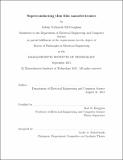Superconducting thin film nanoelectronics
Author(s)
McCaughan, Adam Nykoruk
DownloadFull printable version (20.67Mb)
Other Contributors
Massachusetts Institute of Technology. Department of Electrical Engineering and Computer Science.
Advisor
Karl K. Berggren
Terms of use
Metadata
Show full item recordAbstract
Superconducting devices have found application in a diverse set of fields due to their unique properties which cannot be reproduced in normal materials. Although many of these devices rely on the properties of bulk superconductors, superconducting devices based on thin films are finding increasing application, especially in the realms of sensing and amplification. With recent advances in electron-beam lithography, superconducting thin films can be patterned into geometries with feature sizes at or below the characteristic length scales of the superconducting state. By patterning 2D geometries with features smaller than these characteristic length scales, we were able to use nanoscale phenomena which occur in thin superconducting films to create superconducting devices which performed useful tasks such as sensor amplification, logical processing, and fluxoid state sensing. In this thesis, I describe the development, characterization, and application of three novel superconducting nanoelectronic devices: the nTron, the yTron, and the current-controlled nanoSQUID. These devices derive their functionality from the exploitation of nanoscale superconducting effects such as kinetic inductance, electrothermal suppression, and current-crowding. Patterning these devices from superconducting thin-films has allowed them to be integrated monolithically with each other and other thin-film superconducting devices such as the superconducting nanowire single-photon detector.
Description
Thesis: Ph. D., Massachusetts Institute of Technology, Department of Electrical Engineering and Computer Science, 2015. Cataloged from PDF version of thesis. Includes bibliographical references (pages 163-171).
Date issued
2015Department
Massachusetts Institute of Technology. Department of Electrical Engineering and Computer SciencePublisher
Massachusetts Institute of Technology
Keywords
Electrical Engineering and Computer Science.